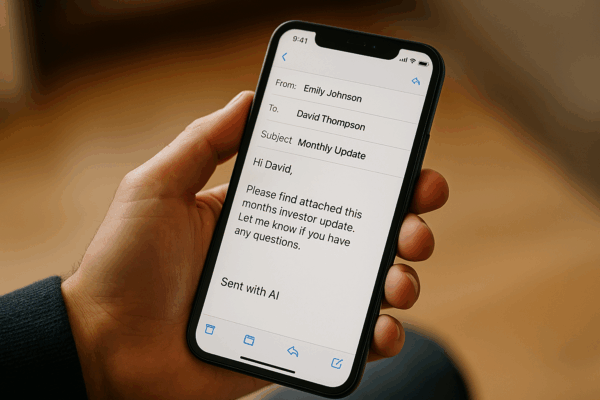Recently I wrote a letter of recommendation for someone I have great regard for. As with everything I do now I started with ChatGPT. I did my best to describe personal and unique traits of this individual because I wanted the final reference to feel authentic. In other words, I wanted the reference to clearly not sound like it was created by AI.
After a few prompt tweaks, I took the original copy from ChatGPT, dropped it into Google docs, added some of my own sentences and adjectives and shot it off to my wife for a review. Her immediate comment was “This sounds like it was written by AI, well, except the parts with grammatical errors which must be yours”. She wasn’t wrong in either regard. What was interesting was her first instinct was to assess if the content had been produced by AI or not – not to actually look at the content itself.
This is the era we are living in.
Can It Sound Like Us?
One of the questions that comes up a lot when HR teams first use Winslow is “Can we make it sound like us – we don’t want it to sound like AI?” It’s a totally expected reaction. HR is, in the end, a communication product inside of your organization. Over time that product will adopt an interface that is most efficient and effective for all parties involved. Some HR departments are clinical in their delivery: crisply pointing employees to resources with minimal explanation. Others are more warm and conversational and pride themselves on this “human” touch. Both have merits and detractions and I would posit neither emerged accidentally over time but were the evolution of lots of communication attempts.
The question though is how do we (and our employees) really want to be talked to. Should we strive for every interaction with HR (and other departments like customer support) to pass the Turing test? Should we spend a lot of time trying to make anything that uses AI feel like it didn’t? I’m not sure the answer is yes. Or, at least, maybe it’s not in the long run.
Technology = Communication Now
The reality is that humans are highly adaptable to subtle changes in communication based on the medium being used and right now we are culturally tuning to the uses and realities of AI in every aspect of our life.
Many of us will remember the “Excuse the typos, sent from my iPhone” footer that got added to so many emails circa 2008-2010. A generation of people were learning to type on glass and adjusted their language to become more terse and more forgiving for the medium.
We all will also appreciate how we’ve changed the way we talk to Google over the years? We pick and choose how to enter search phrases to get what we want as a combination of what is most efficient and how we have learned to get the best results. I would surely type “vegan chili recipe” into Google instead of “Please give me a vegan chili recipe” but I might type into ChatGPT “A vegan chili recipe i can prepare in under 20 minutes” vs “Vegan chili 20 mins prep”.
I even chuckled when talking to one of our advisors yesterday who described how she engages with some teams in her org around a process to document tribal knowledge. She starts the meeting with “Pretend that I have not worked here before and that I’m a new HR staff member doing my first employee onboarding. List the steps I’d ask an employee to walk through, don’t skip any, and make sure you explain as much detail as possible.” I don’t think she realized until I pointed it out that this could literally be the start of a prompt for ChatGPT (she’s a heavy GPT user).
Is Being Human so Great?
There is also evidence that humans prefer NOT to talk to humans in lots of HR situations. The minute a human is introduced into these situations, human biases can be introduced as well. Humans might want to understand how to report issues with their manager or other employees without repercussions. Some employees might also feel HR team members can have bias towards corporate profitability over their needs. Also, it should not be taken for granted that HR chatbots don’t mind if you ask the same question 10 times a year 🙂
As we reach the uncanny valley with AI we’re sure to thrash about a bit while we find our footing here. It’s not clear that hand writing every email to make it feel like it comes from a human or prefacing every AI-assisted email with “Excuse the banality, composed using AI” is the right solution. To our children this will all seem as silly as adding “Excuse my typos” to every email sent from an iPhone.
The Way Forward
As with all things communication, it feels like the right answer is “it depends”. As purveyors of a communication product in our organization lets offer our employees some choices. Some will love talking to a HR chatbot because it feels efficient, anonymous and unbiased. Others will want to talk to a human because it feels, well, human. It’s in the middle that technology can help bridge the gap as we all learn how much we care that AI was involved in the communication process.
And yes, in case you were wondering, this month we are adding the ability to train AI generated responses in Winslow on your team’s tone so they feel as human as possible even if they were assisted by AI. If you’d like to learn more about how Winslow can help your HR team save 75% of their time answering employee questions, we’d love to show you a demo!



